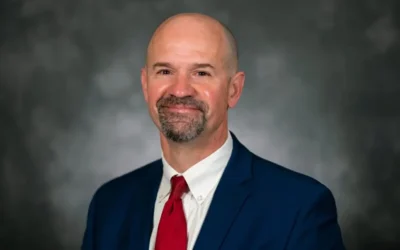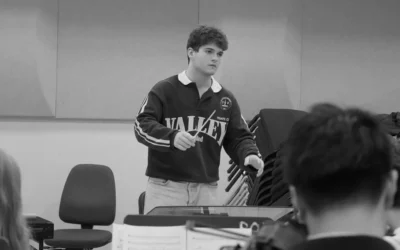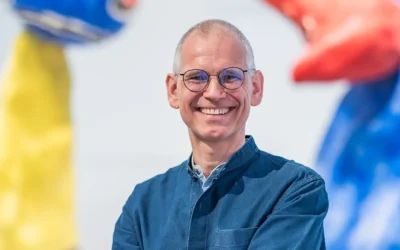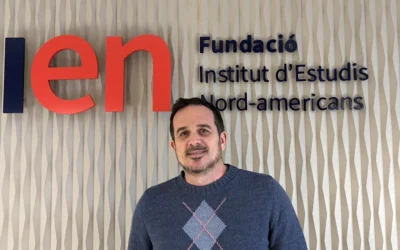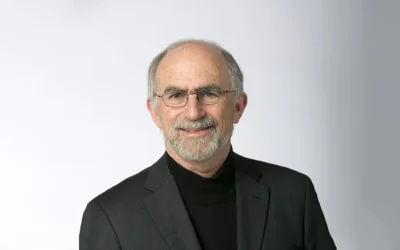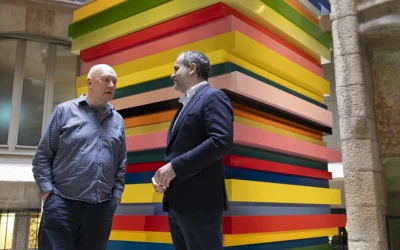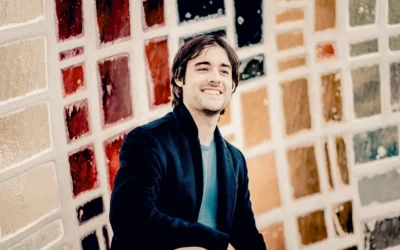Ilya Levinson: “There is something different in American classical music due to the mix of cultures.”
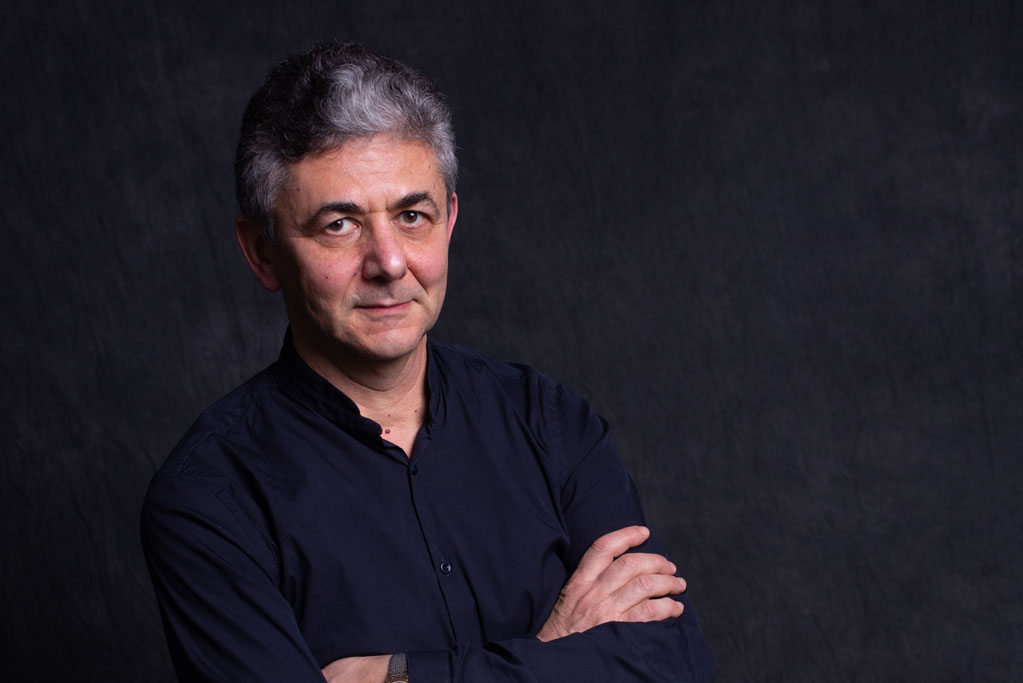
(Ilya Levinson by friendsfirstphoto.com)
Ilya Levinson is an American music composer, born in Russia. He is Associate Professor at Columbia College, Chicago and director of composition studies. He joined us last December in the IEN Classical Music Concert where his great Klezmer Rhapsody was performed by Ala Voronkova and Guerassim Voronkov. It was amazing to have him as part of the audience. Levinson’s catalog includes operas, musicals, symphonic and chamber music, film scores and original music for theater productions. It is a very wide range of composition styles. We didn’t want to miss the chance to talk to him.
If I can ask, what brings you to Barcelona?
This performance. I met Guerassim in Barcelona in 2015. We have been friends since then, and we have met on several occasions. In 2019, just before the pandemic, Guerassim and Ala invited me to their festival in Saillagouse (France) to play a concert of Jewish-themed music. There we played my Klezmer Rhapsody in an arrangement for viola, violin, cello and piano.
I wrote the Klezmer Rhapsody in 1998 for violin and orchestra, and I made different arrangements for smaller instrumental combinations which have been performed several times. I did an arrangement for violin and piano much later for my German friend David Yonan, who is a virtuoso violinist. Now I am extremely happy that Guerassim and Ala included my piece in their repertoire. In the most recent concert, Ala’s violin performance was electrifying.
Your music is very moving and spiritual. In the same piece of music there are very energic moments and calm sections. You go from one extreme to the other
It is the task of composers to program moments of reflection into their music, like in a church service, where there is a planned moment for meditation after the sermon. In the symphonic tradition, for example, the second movement of the symphony is a slow movement to give time for people to quieten down emotionally, because music definitely steers our emotions. If Greek philosophers stated that the Cosmos is ruled by numbers, the music moves those invisible parts of our body like the heart and soul.
So, music is more than entertainment.
Absolutely! People listen to music and they become immersed in it. This tells us that it is not only entertainment. If music were presented as something that requires an intellectual effort to listen to it, few people would go to a concert, but music has its effect on you if you listen to it attentively.
If we exclude George Gershwin, Leonard Bernstein and John Williams, American classical music composers are not very often performed here in Catalonia, nor in Spain generally. Do you have any opinion about why?
I think the general opinion of American music is that American music is jazz. For a composer it takes time to become a household name, like Gershwin. Most people know who Gershwin was, they love Porgy and Bess so they may decide to go to a concert where Gershwin’s music is performed. Also, to a John Williams concert as he is very well-known because of the movies. And Leonard Bernstein…. for sure! Maybe the general public recognizes some pieces by Aaron Copland, Samuel Barber, William Shumann or the minimalist Philip Glass.
European countries care about their composers. In America there are no national prizes for classical composers, like there are in European countries. Jazz is considered to be the official American music and is recognized all over the world.
Film music is now carving a niche in concert programing. The Chicago Symphony Orchestra performs The Lord of the Rings live!
Maybe it is an easier music to follow, to listen to.
There are certain canons and rules about film music which are followed by film composers, to have easy access for the viewer.
If you look at Bernard Herrmann’s scores, they are very well-conceived and very well-written. He is an undisputed benchmark of music for the cinema. He worked with Alfred Hitchcock for whom he composed the music for movies like Vertigo.
In all movies, music is very important to create the atmosphere the director is searching for.
It has its role. In fact, all these high violins and dissonant sounds we hear in Hitchcock’s movies come from Arnold Schoenberg. Arnold Schoenberg was an Austrian composer who moved to Hollywood from Vienna to escape the Nazi regime; at one point he planned to become a film composer. Thank God it did not happen! He was one of the first composers to delve into atonal composition. He was teaching in two L.A. universities, and he has shaped much of twentieth-century musical thought.
Do you think that there are any special features of American classical music that distinguish it from European music?
There is something different in American classical music due to the mix of cultures. Some pieces written by American composers come from different cultural sources. They don’t come from a canon, but rather from ignoring canon or breaking canon. For example, when a European composer wants to write a symphony, they would think, “what new ideas could I bring to the symphony after Beethoven, Bruckner or Brahms?” I wondered, at one point, if I should follow this tradition or just write music without caring much about whether my music would sound American or European.
When Antonín Dvořák was invited to direct the National Conservatory of Music in New York (1892), he was the first to say that Americans had such a rich source of inspiration in Negro spirituals, that they had to use them to establish serious and original school of composition. Out of his experience, he wrote Symphony No. 9, subtitled From the New World.
There was no American classical school of composition at the beginning of the twentieth century. American classical composers studied in Europe with Nadia Boulanger. This gave them prestige among critics who once wrote “Gershwin brings concert music down to the level of jazz, while Copland elevates jazz to the level of concert music”. Guess who had studied in Paris at that time?
This conception actually changed thirty years ago when Gershwin became a recognized subject of academic research. My dissertation at the University of Chicago was “Gershwin and Joseph Schillinger”. Joseph Schillinger was a Russian immigrant who developed the system of musical composition. He taught many commercial musicians, and Gershwin was one of his most famous students. After Gershwin’s death Schillinger claimed that Porgy and Bess was written according to Schillinger’s system.
In the critical opinion you needed to go to Europe to study music composition, and this is partly still true. Nowadays people go to IRCAM (L’Institut de recherche et coordination acoustique/musique) in Paris or go to Germany.
It seems to be difficult to be a classical music composer in the United States
Writing music takes a lot of time, so most of the American music composers teach. There are no subsidies for them. So, the universities give you a position, you teach, but you also have time to compose. Most of the great American Universities are located outside the big cities, in the middle of cornfields, where a composer can have a lot of time and lot of space. Around you there is nothing but hundreds of miles of a blank canvas so, do whatever you want. There is no firmly established tradition. This is my explanation for this multiplicity of styles. America is a very big space, so everyone can fit in.
The social network for music is different from Europe. I know a little bit about the funding for music in Europe, but funding in the Soviet Union was that twice a year the Ministry of Culture would buy a symphony or a concerto from you. You could write whatever you wanted although, it should probably be in a certain style, conform with the official ideology to an extent. So, you could earn your living by writing music.
In the States there are some foundations that give grants to composers, like Fromm Music Foundation, but in general, most of the composers teach.
Sometimes when we talk about American classical or concert music people have in mind minimalist music, which is not easy to understand.
One of the first minimalist music compositions was Terry Riley’s In C (1964) which was written in the United States. I came to the States in 1988 from Moscow and I was classically trained and with a very conservative taste. John Cage and his piece 4’33’’, which is 4 minutes and 33 seconds of silence was surprising for me. I saw John Cage on his 80th birthday. He said something that made me understand the purpose of 4’33’’: every listener has their own piece of music during 4’33’’ because every person hears different noises and sounds in the silence. So, it is ok! I think this explanation tells us a lot about our American musical mentality: Everyone hears different things in music.
Cage is definitely a product of American Culture.
In 2016 you were a Grammy Nominee. What were you nominated for?
I am Music Director of New Budapest Orpheum Society, ensemble-in-residence at the Humanities Division at the University of Chicago, a group performing Jewish Cabaret music, which is a term invented by our artistic director Philip V. Bohlman to name this political satire which highlights the faults in society.
We recorded three CDs: Dancing on the Edge of a Volcano, Jewish Cabaret in Exile, and As Dreams Fall Apart: The Golden Age of Jewish Stage and Film Music (1925–1955). For the last CD we were nominated for a Grammy in 2016.
The next performance we are going to be involved in is about Erich Korngold, a successful composer of concert and film music who went to Hollywood fleeing the Nazis.
His opera Die Kathrin will be performed at the University of Chicago. We are going to provide a concert to give a background of the music at the time of Erich Korngold.
What we are doing is preserving the music of Jewish composers, especially the music which has been forgotten. We perform songs by Philip V. Bohlman found in the Austrian archives. We also work with researchers from Performing the Jewish Archive in the UK. There is a wealth of material from Theresienstadt concentration camp, where there was an incredible music life.
Researchers from Performing the Jewish Archive have found fascinating great uplifting music in Theresienstadt concentration camp. Music which has never been performed outside of the concentration camp, like Viktor Ullmann’s last music compositions.
Music always tries to take you out of the ordinary.
